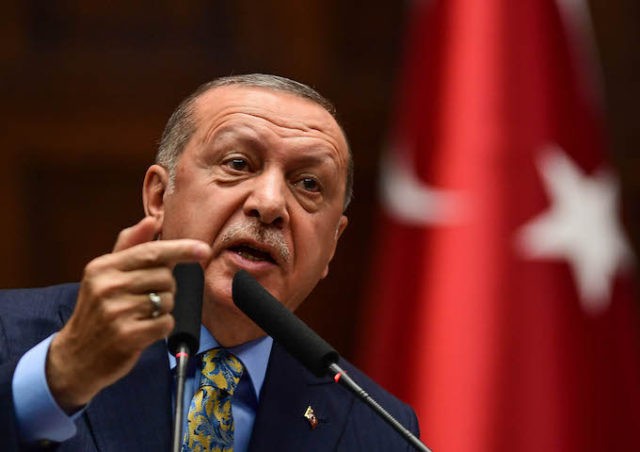The top government prosecutor in Turkey submitted an indictment against the Peoples’ Democratic Party (HDP), a pro-Kurdish opposition coalition, on Wednesday demanding the state disband the party.
The HDP rose to prominence in 2015, winning a sizable number of seats in Turkey’s parliament and eating into the ruling Islamist Justice and Development Party (AKP)’s majority in the lawmaking body. HDP members have called for President Recep Tayyip Erdogan to limit violent military activity in the mostly Kurdish Turkish south. They also objected to Turkish military attacks on Kurds in Syria and Iraq and demanded respect for the rights of religious minorities.
Following the failed coup against Erdogan in 2016, the government organized another round of elections to erase HDP gains and began engaging the mass arrests of the HDP’s senior leadership. Among those arrested were the two co-chairs of the party, Figen Yüksekdağ and Selahattin Demirtaş. Demirtaş ran a failed presidential campaign from prison against Erdogan in 2018 and remains behind bars. Yüksekdağ faces at least six different criminal charges since her 2016 arrest and has only had one charge, “insulting the president,” dropped this year.
Turkey’s top prosecutor Bekir Sahin argued in his 600-page indictment this week that the HDP was a front group for the Kurdistan Workers’ Party (PKK), a Marxist group designated a terrorist organization by the United States. The PKK advocates for the creation of a sovereign Kurdistan and often engages in violent acts against the Turkish state, in response to increasingly severe crackdowns in Kurdish regions of Syria.
The indictment, according to Turkey’s state Anadolu news agency, concludes “HDP is linked with the PKK terror group … and that it is the terrorists’ offshoot in legal disguise.” Among the evidence in the indictment is the allegation that HDP congresses and meetings “were not like the ones founded in accordance with the Constitution and laws, but like they are platforms where slogans supporting the separatist PKK terror group and its ringleader are chanted.” It also claims the HDP had no true electoral success without agitation by the PKK.
Sahin concludes in his indictment the HDP is irreparably corrupt and must be forced to disband. Anadolu noted the indictment also urges the Turkish court system to confiscate all of the party’s assets and treasury grants.
The Turkish government moved to depose an HDP lawmaker on the same day it moved to disband the party. Omer Faruk Gergerlioglu is facing criminal charges of “spreading terrorism propaganda” for a social media post where he allegedly shared an article “in which the Kurdish militants [the PKK] urged the government to take a step toward peace,” according to the Agence France-Presse (AFP). Gergerlioglu is the 14th HDP lawmaker deposed by the government despite being democratically elected and imprisoned.
“I will resist the coup against the Turkish Grand National Assembly, the will of the nation cannot be trampled,” Gergerlioglu said in a statement following the decision. “Wanting peace is not a crime.”
The communications director of the Erdogan government, Fahrettin Altun, issued a separate statement of support for the indictment on Wednesday, pressuring the court system to do the government’s bidding.
“It is an indisputable fact that the HDP has organic ties to the PKK, which Turkey, the United States and the European Union consider a terrorist entity,” Altun asserted in a statement on Twitter carried by Anadolu. Altun couched his pressure on the court system by insisting, “Whether that relationship warrants the HDP’s closure or its subjecting to another punitive measure is a question that the Constitutional Court alone can answer.”
The HDP responded to the attacks with a statement describing the move to disband the party as a “heavy blow to democracy.”
“We call on all the democratic forces, the social and political opposition, and on our people to join a common fight against this political coup,” the HDP urged.
Separately, the current co-chairs of the party, Pervin Buldan and Mithat Sancar, expressed hope that Turkish voters would redeem the party in future elections by giving the HDP more power.
“It is our duty to create an environment in which we will not be unjustly detained in prisons,” Buldan said in her public statement, according to the anti-Islamist newspaper Cumhuriyet. “As long as the HDP exists, we will continue to stand by our peoples and do democratic politics.”
The HDP first made its mark on the national stage in the 2015 parliamentary elections, a historic vote where Turks sent a record number of women, Christians, Yazidis, and Kurds to the federal legislature. That year, the HDP made its debut in parliament with 78 seats, compared to 276 seats for the ruling AKP. A political party needs to receive over ten percent of votes to have representation in Parliament; the HDP received 12 percent that year.
The Erdogan government’s attitude towards the HDP changed dramatically after the failed coup of July 2016, which Erdogan blamed not on the PKK, but on rival cleric Fethullah Gülen. Gülen, who lives in Pennsylvania, has denied any association with the attempt to overthrow Erdogan, and multiple U.S. administrations have insisted that Turkey has failed to meet the threshold of evidence necessary to extradite the elderly cleric.
In November 2016, police arrested Demirtaş and Yüksekdağ, the co-chairs at the time, in a late-night raid that also targeted about a dozen HDP lawmakers. Authorities issued vague accusations of alliances with terrorists but did not process the cases for weeks. In December of that year, HDP leaders accused the Erdogan government of torturing Demirtaş with unnecessary isolation after authorities refused to place him in a cell near another imprisoned HDP member, Abdullah Zeydan.

COMMENTS
Please let us know if you're having issues with commenting.